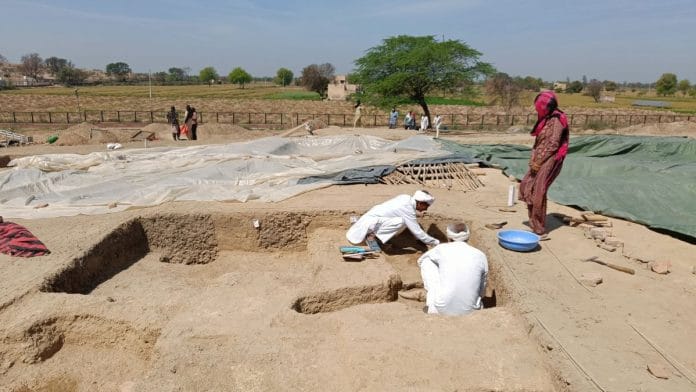New Delhi: It was Manmohan Singh’s government in 2009 that pushed the Archaeological Survey of India to formulate a national policy on excavations and explorations. Meetings were held, sub-committees were formed, and files moved to the culture ministry for approval, but the policy never materialised.
Now, in the absence of a guiding framework, the 164-year-old institution is considering a fresh action plan for approving excavation licenses.
“Under the new action plan, licenses will only be given when the applicant gives an excavation plan for at least three years. This time is enough to excavate the site and understand its chronology,” said Yadubir Singh Rawat, director general of ASI.
Rawat said archaeologists applying for licenses will need to submit a detailed excavation plan for the site, their objectives, and the context in which they want to dig.
ASI’s renewed push follows several CAG and parliamentary standing committee reports that criticised the body for the lack of an excavation policy.
“ASI is not just for digging. The dig should be in some context—which answers the long pertaining civilisational questions. That is missing in current excavations. So we have decided that applicants have to submit proper plans before excavations,” Rawat said.
In the absence of a concrete action plan, despite ongoing excavations, ASI has also been criticised for not publishing its reports on time.
Rawat’s stance coincides with the Rajya Sabha parliamentary standing committee report on transport, tourism and culture, tabled in 2023.
“The Committee also feels that there is a need to prioritise excavation sites based on a comprehensive assessment of historical significance, research potential, and preservation needs. The ASI should focus on areas that have the potential to answer crucial historical questions and contribute to a deeper understanding of India’s rich past,” reads the report.
In 2013, a decade before the parliamentary committee’s report, the CAG had similarly highlighted that excavation licenses were not being issued systematically to address cultural or historical debates.
Even the Central Advisory Board of Archaeology (CABA), which decides on excavation proposals, met in 2022 after a gap of eight years. Its most recent meeting was held this year, in which culture minister Gajendra Shekhawat outlined plans to revamp ASI’s Underwater Archaeology Wing (UAW), currently carrying out explorations in Dwarka waters.
“It’s time for a course correction. The new policy will help us work in a systematic way and bring excavation works in the larger context of history,” said a senior ASI functionary.
Also read: You won’t dig this—ASI’s budget doubled in last 10 yrs, but it spent less than 1% on excavations
Excavation opportunity to new people
ASI’s new action plan will also give opportunities to new archaeologists to work on India’s most significant sites, such as Rakhigarhi.
“How long will the same people dig the site? Under the new plan under consideration, we will give opportunities to new archaeologists who can give a fresh perspective about the iconic sites,” said Rawat.
Rawat, a senior archaeologist, was appointed director general of ASI in 2023. After he took charge, licenses were withheld for sites such as Rakhigarhi and Rajgir.
Until now, excavation licenses were granted annually based on proposals from ASI circles, branches, universities and research institutions.
One of the most celebrated sites, Rakhigarhi, has been excavated multiple times in the past. The most recent excavations were led by senior archaeologist and additional director general of ASI, Sanjay Manjul. But ASI headquarters did not grant a license for the site in 2024-25.
Before Rawat, KK Basa was director general of ASI and held several meetings on framing an excavation policy. In December 2023, he chaired a two-day conference titled ‘Looking Beyond: Vision Statement for Excavations by 2035’.
After Basa’s tenure, Rawat continued work on shaping the excavation policy and on giving opportunities to younger archaeologists.
“We will bring [in] a new archaeologist to Rakhigarhi for excavation in upcoming seasons. The site was excavated several times in the past but despite its potential, we have failed to give a large historical perspective,” said Rawat,
For Rawat, new people mean new ideas and perspectives.
“Senior archaeologists will be in a guiding role,” he added.
(Edited by Prashant)






